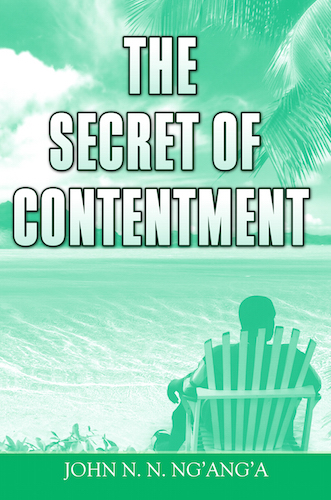Books

The Secret Of Contentment
The secret of contentment is a subject of interest to many people. Why are some people living contented lives, while others, who for all practical purposes should be happy and contented, surprise us by committing suicide?
The dictionary defines contentment as a feeling of satisfaction with what one has, or happiness, or feeling satisfied with something even if one would not have minded more of it or something better.
This feeling of satisfaction is the desire of most human beings. However, some never achieve it. Apostle Paul knew how to achieve the secret of being content.
“I am not saying this because I am in need, for I have learned to be content whatever the circumstances. I know what it is to be in need, and I know what it is to have plenty. I have learned the secret of being content in any and every situation, whether well fed or hungry, whether living in plenty or in want. I can do everything through him who gives me strength.”
Philippians 4:10-13
Please note the use of the word learned and secret in verses 11 and 12. First, if something is a secret, it means that it is not easy to get to know it. No wonder then, many people have not found contentment. They have not discovered the secret.
Secondly, if it has to be learnt, only serious students can learn it. It means that there is a process. It is not a gift; it is a result of going through a process. If one is too lazy to invest in learning, then one cannot discover the secret.
Even as you pick this book to read it, you have to fight the temptation not to invest your precious time in reading it. Many people are living discontentedly because they are unwilling to break their group behaviour and find out for themselves what can bring them true joy. There are many things that Paul got as gifts but the secret of contentment had to be learned.
Thirdly, please note that contentment is not a function of wealth. Paul needed to learn how to be contented when he had plenty, and even when he was in scarcity. Have you ever imagined that you could be discontented when wealthy? This is what Paul is saying. When he had plenty, he discovered he could still lack joy, therefore he purposed to learn how to be joyful though in plenty. Richer families who have the money to buy all the ‘gadgets’ of modern living are more likely to be unhappy than poor families. The more you have, the more you want and the more unsuitable demands continue to create hunger. In fact, suicide incidents could even be higher among the rich than among the poor.
Many achievements only bring transitory happiness. Passing an examination is a good example, because you soon realize one examination result only qualifies you to face yet another examination. Buying the dream car only makes you realize that your friend can afford a better car than you.
On the other hand, poverty by itself does not bring contentment. There are many poor, joyless people. That is proof enough that poverty does not bring joy.
A poor person might risk imprisonment through stealing because he/she is not contented. But if you have contentment at whatever state, you will not steal to achieve an improvement, much as the improvement is welcome. Contented people have so much joy that they cannot steal even when the alternative is death.
About John N. N. Ng'ang'a
John N. N. Ng'ang'a runs a constultancy firm: TARUMA CONSULTANCY LTD. He sits on the boards of various organizations and companies and is also a writer.
